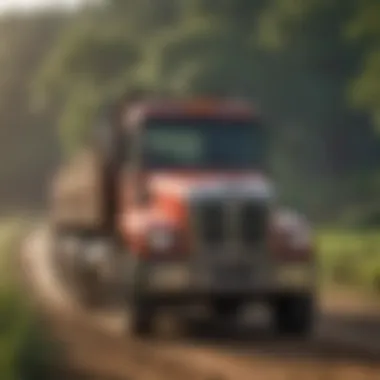Used Daycabs: A Strategic Asset in Transportation


Intro
The integration of used daycabs into agriculture and transportation is gaining attention. These vehicles play a crucial role in meeting the logistical demands of both small farms and large enterprises. As many operators look for cost-effective solutions, understanding the unique attributes of used daycabs becomes essential. This article investigates how these vehicles can benefit operations in agricultural transportation, detailing their economic viability and performance.
Latest Trends in Agriculture
Overview of Current Trends
In recent years, agriculture has witnessed significant shifts. The rising costs of new vehicles and changes in operational requirements compel many farmers to consider used daycabs. These trucks, known for their maneuverability and efficiency, cater to diverse transportation needs. Farmers are increasingly leveraging daycabs to streamline their logistics, including delivering products to market and transporting goods between sites.
Impact of Technology on Farming Practices
The role of technology in agriculture cannot be overstated. Tools such as GPS and telematics enhance the utility of used daycabs. Technology allows for better route planning and vehicle tracking, improving operational efficiencies. Moreover, the introduction of electric daycabs is beginning to emerge on the market, promising lower emissions. As technology continues to evolve, its influence on transportation and farming practices will only increase.
Sustainable Practices: Towards a Greener Future
Importance of Sustainability in Agriculture
Sustainable practices in agriculture are essential for ensuring long-term viability. The transportation sector, including the use of daycabs, can contribute to these goals. By selecting used daycabs, farmers reduce waste and resource usage associated with manufacturing new vehicles. This approach supports a circular economy and minimizes environmental impact.
Methods for Sustainable Farming
Farmers can adopt several methods to enhance sustainability in their operations. These methods may include:
- Integrating crop rotation to improve soil health.
- Utilizing precision agriculture to minimize resource use.
- Adopting environmentally friendly transportation options, like hybrid or electric daycabs, when available.
Each of these practices can help farmers reduce their operational footprint while maintaining productivity.
Key Considerations When Purchasing Used Daycabs
Purchasing used daycabs requires careful assessment. Potential buyers need to evaluate several factors:
- Vehicle Condition: Thorough inspections help identify any existing issues.
- Mileage and Age: Younger, less-used models typically offer better reliability.
- Repair History: Understanding prior maintenance can reveal potential future issues.
- Compatibility: Ensure the daycab meets specific operational needs, especially load capacity.
By keeping these factors in mind, farmers can choose a vehicle that enhances their operational efficiency and meets their budget constraints.
"Investing in a reliable used daycab can significantly optimize transportation in agriculture, proving to be economically sound for both large and small-scale farms."
Ending
Used daycabs are more than just vehicles; they are strategic assets for agricultural transportation. Their economic viability and operational effectiveness make them a suitable choice for diverse farming operations. By focusing on key considerations during purchase and exploring best practices for maintenance and modifications, farmers can maximize their investment in these vehicles. This analysis sets the stage for deeper exploration into the practicalities of integrating used daycabs into agricultural logistics.
The Significance of Daycab Trucks in Agricultural Transportation
Daycab trucks play a critical role in the transportation landscape, especially within agriculture. These vehicles provide several advantages that enhance operational efficiency and effectiveness within this sector. Understanding their significance goes beyond their simple utility; it encompasses their impact on logistics, cost management, and overall farming productivity.
Understanding Daycab Trucks
Daycab trucks are designed for short-haul operations, where the primary focus is on urban or regional distribution. Unlike sleeper cabs, daycabs lack a sleeping compartment, making them lighter and shorter. This design is beneficial for farmers and businesses in agriculture who require frequent stops and quick turnaround times.
Key features often include:
- Maneuverability: Their compact size allows easy navigation on narrow farm roads or urban environments.
- Fuel Efficiency: Designed for short distances, daycabs typically consume less fuel compared to larger trucks.
- Cost-Effective Maintenance: Fewer components compared to larger models result in lower maintenance costs.
These factors lead to a higher efficiency when transporting crops and supplies from field to market. Daycabs provide practicality for farmers who may require agility in operations and the ability to manage diverse agricultural logistics in real time.
Role in the Agricultural Supply Chain
The agricultural supply chain is multifaceted, involving various steps from farm production to consumer delivery. Daycab trucks fit prominently within this supply chain due to their operational efficiency.
- Timely Harvest Transportation: Once crops are harvested, time is critical. Daycab trucks can quickly transport produce to processing facilities or markets, ensuring that freshness is maintained.
- Flexible Load Management: With varying types of agricultural products, daycabs are suited for hauling mixed loads. This flexibility is crucial for farmers who need to move different products at once.
- Cost Reduction: Utilizing used daycabs can reduce transportation costs significantly. Farmers save money on both upfront purchasing and operational costs, enhancing business sustainability.


In essence, daycab trucks facilitate smoother logistical operations. Their significance in agricultural transportation cannot be understated, as they contribute to more streamlined processes, better resource management, and enhanced profitability for farming enterprises.
Economic Considerations of Used Daycabs
Understanding the economic factors surrounding the use of daycab trucks can greatly influence decisions in the agricultural and transportation sectors. The choice to invest in used daycabs hinges not only on their initial cost but also on how they perform over time and their value in day-to-day operations. A comprehensive analysis of these elements reveals significant advantages which can contribute to smarter operational strategies.
Cost-Effectiveness of Used Daycabs
Cost-effectiveness is a crucial factor in any business decision, particularly in agriculture where margins can be tight. Used daycabs typically carry a lower price point compared to new trucks. This affordability allows farmers to allocate their finances towards other necessary resources or investments in technology.
When considering a used daycab, there are various aspects that contribute to its cost-effectiveness:
- Initial Purchase Price: The lower initial cost of used daycabs means less financial strain. This can be especially beneficial for small to mid-sized agricultural operations.
- Financing Options: Many financial institutions offer favorable terms for used trucks, making them more accessible.
- Insurance Costs: Used daycabs generally attract lower insurance premiums due to their reduced market value.
- Operating Costs: Recognizing that used daycabs may have higher maintenance costs initially, these expenses can be offset against the savings made on the purchase price.
This effectiveness extends beyond mere acquisition costs; it encompasses the entirety of operational efficiency and cost management.
Resale Value and Depreciation
When analyzing economic considerations, resale value and depreciation of used daycabs become a pivotal point of discussion. Understanding these factors helps in forecasting future expenses and returns.
- Depreciation: Vehicles tend to depreciate over time, affecting their market value. Daycabs, particularly those over a certain age, exhibit less depreciation than newer models. This trend can provide an additional return on investment when it’s time to sell or trade in a vehicle.
- Market Demand: The demand for reliable used daycabs remains consistent, particularly as farms expand and the need for transportation grows. This consistent demand can help maintain reasonably high resale values.
- Right Time to Sell: Knowing when to sell can enhance profit. Historically, daycabs tend to retain value best when they are kept for shorter ownership durations before they reach high mileage.
In summary, the economic viability of used daycabs in agriculture is influenced by several interlinked factors, primarily revolving around initial costs, maintenance considerations, and potential resale value. Farmers and agricultural businesses need to analyze these aspects carefully to ensure they are making the best financial decisions possible.
Key Features of Used Daycab Trucks
The features of used daycab trucks are paramount when considering their role in agricultural and transportation operations. Understanding the specific characteristics not only helps buyers make informed decisions but also aligns truck capabilities with operational needs. This section elaborates on several critical aspects of used daycab trucks that enhance their functionality and suitability for work in agriculture.
Engine Specifications and Efficiency
Engine specifications are crucial as they dictate the power and fuel efficiency of used daycab trucks. Typically, these trucks come equipped with a variety of engine options, ranging from 6 to 12 cylinders. The choice of engine affects not just the truck's performance but also its operational costs over time. For instance, a truck with a turbocharged diesel engine can provide better fuel efficiency and higher torque, which is beneficial for hauling heavy loads typical in agriculture.
Moreover, many models feature advanced fuel management systems that optimize diesel consumption, leading to significant savings in operating costs. This is an important consideration for farmers and transporters focused on maximizing profitability—especially as fuel prices fluctuate.
Other noteworthy aspects include:
- Horsepower Ratings: Relevant for determining load capacity.
- Torque Output: Affects acceleration and climbing abilities on rugged terrain.
- Compliance with Emission Standards: Critical for environmentally-conscious operations.
Cab Design and Comfort
The design and comfort of the cab in used daycab trucks also warrant attention. A well-designed cab can significantly enhance the operator's experience, impacting both productivity and safety. Daycabs are typically compact, making them ideal for urban environments while also providing adequate space for long hours on the road.
Some features to consider include:
- Seating and Ergonomics: High-quality, adjustable seats can reduce fatigue during long hauls.
- Visibility: Larger windows and strategically placed mirrors improve safe maneuvering in agricultural settings.
- Control Layout: Intuitive placement of controls supports easier operation, reducing the risk of accidents.
Comfort features, such as air conditioning and sound insulation, also add to the overall working experience. Buyers should evaluate these elements to ensure they choose a truck that fosters both comfort and productivity.
Durability and Maintenance Requirements
Durability is a key characteristic of used daycab trucks, influencing their suitability for the harsh conditions often found in agriculture. Farmers need vehicles that can withstand wear and tear over time. When selecting a used truck, potential buyers must assess the materials used in construction and overall build quality.
Regular maintenance is also vital for longevity. Used daycab trucks should have reasonable maintenance records to indicate that they have been serviced consistently. The focus should be on:
- Parts Replacement History: Replace major components to avoid future repairs.
- Service Intervals: Adherence to recommended maintenance schedules is essential for durability.
- Onboard Diagnostics: Many modern trucks come with diagnostic systems that aid in the early detection of issues.
By considering these key features, agricultural professionals can better understand the capabilities of used daycab trucks. This knowledge equips them to choose vehicles that not only meet their immediate demands but also contribute to long-term operational success.
Buying Used Daycabs: Considerations and Tips
When purchasing a used daycab, buyers must navigate various critical factors. This choice, whether for farming or transportation, has implications for both financial aspects and operational efficiency. Understanding these factors can lead to better decision-making.


Evaluating Vehicle History and Condition
One of the first steps in buying a used daycab is examining its history. A thorough vehicle history report provides insights into past accidents, ownership changes, and service records. These details can indicate how well the truck has been maintained over time.
Make sure to check:
- Maintenance Records: Regular servicing improves reliability. Look for documentation that shows adherence to a regular maintenance schedule.
- Accidents: Past accidents can affect the integrity and safety of the vehicle. A comprehensive report will help clarify this.
Inspect the vehicle in person as well. Look for signs of wear and tear in key components like the engine and transmission. Make note of any visible damage, such as rust or frame issues. A thorough inspection can prevent unexpected repairs post-purchase.
Assessing Mileage and Wear
Mileage serves as a significant indicator of a daycab’s overall condition. Generally, lower mileage suggests less wear, but that is not the only factor to consider. The usage type of the vehicle is equally important.
When assessing mileage and wear, consider:
- Type of Use: A daycab used for local delivery may have different wear patterns than one used for long-haul trips. Understanding the average load and distance driven can enhance your knowledge of the truck's durability.
- Physical Inspection: Look for signs of wear in the tires, brakes, and suspension. If these components are worn, the vehicle might have seen heavy use, despite lower mileage.
Sometimes, it is better to choose a daycab with slightly higher mileage but better maintenance history over one that has low miles but has not been kept up well.
Negotiation Strategies
Once you evaluate the vehicle and its condition, it is time to negotiate the price. When negotiating, be aware of the fair market value of similar trucks. Researching prices on platforms like Facebook or Reddit can offer a strong base for your negotiations.
Here are some effective strategies:
- Highlight Issues: Use any defects or maintenance needs discovered during inspection as leverage to request a lower price.
- Be Prepared to Walk Away: Show that you have alternatives. If negotiations stall, be willing to leave. This can prompt the seller to reconsider.
- Offer Cash Upfront: If possible, offering to pay in cash can sometimes lead to a better deal, as sellers may prefer immediate transactions.
Good negotiation is not just about getting the lowest price; it’s about ensuring the vehicle meets your needs without sacrificing quality.
In summary, buying a used daycab requires careful assessment and negotiation. By focusing on vehicle history, assessing wear, and employing effective negotiation strategies, you can find a suitable daycab that aligns with your agricultural or transportation needs.
Practical Applications of Used Daycabs in Farming
Used daycabs play a vital role in modern agriculture, providing solutions that are not only efficient but also cost-effective. These vehicles cater specifically to the needs of farmers and agricultural logistics, maximizing productivity while minimizing operational costs. Understanding how daycabs can be effectively utilized in various farming applications is critical for agricultural enterprises aiming for a competitive edge.
Transporting Harvests Efficiently
Transporting harvests is a significant aspect of agricultural operations. Used daycabs offer farmers the ability to haul large quantities of goods quickly and reliably. Harvests can be delicate, meaning they require vehicles that can handle the weight and ensure protection during transport. Daycabs, with their robust build and varying storage options, allow for safe transportation of crops from fields to markets or processing facilities.
Moreover, trucks like the Freightliner Cascadia or International ProStar tend to have strong engines and great fuel efficiency, which is crucial for long-distance hauling. Farmers can optimize their routes to avoid delays, thus maintaining the freshness of their produce.
Moving Equipment and Supplies
Another significant function of used daycabs is in moving equipment and supplies around farming operations. Whether it’s transporting tractors, plows, or other tools, daycabs can handle a variety of trailer configurations. This flexibility allows farmers to consolidate their transport needs into a single, more efficient delivery system.
Larger daycabs can accommodate specialized equipment trailers, making it easier to move between different fields or job sites. This capability not only saves time but also cuts down on costs associated with multiple vehicle fleets. Properly maintained used daycabs from reputable brands, such as Kenworth or Peterbilt, can be economical choices for this purpose.
Logistical Considerations in Agriculture
Logistics in agriculture can be complex, given the time-sensitive nature of many tasks. Used daycabs must be integrated into a strategic logistical framework to maximize their effectiveness. Elements such as route planning, scheduling, and load management become paramount.
Farmers need to assess the specific demands of their operations. For example, logistics for seasonal produce may involve a different strategy compared to year-round crops. It is essential to have clear communication channels and scheduling practices in place, ensuring the daycabs are utilized optimally.
A deeper understanding of regional agricultural needs can inform better decision-making for fleet management. Regular maintenance checks of used daycabs also contribute to minimizing downtime and enhancing productivity across all logistics phases.
"Utilizing used daycabs in agriculture brings a mix of efficiency and economic benefits, addressing the essential needs of farmers without stretching their budgets."
By contemplating these practical applications, agricultural professionals can better assess how used daycabs fit into their operations. They not only provide functional support but also foster growth opportunities in an ever-evolving agricultural landscape.
Maintenance Best Practices for Used Daycabs


Maintaining used daycabs is crucial for ensuring their reliability and efficiency in agricultural transportation. Proper maintenance affects not only the performance of the vehicle but also its longevity. Farmers and logistics professionals alike benefit from understanding how to keep their daycabs in optimal condition. This knowledge translates to minimizing downtime and maximizing productivity in their operations.
Routine Checks and Servicing
Routine checks and servicing play a pivotal role in the upkeep of used daycabs. Regular inspections can help identify potential issues before they escalate into more significant problems. A systematic approach to maintenance includes:
- Oil changes: Regular oil changes keep the engine lubricated and functioning properly. Consult the owner's manual for guidance on intervals based on mileage and operating conditions.
- Tire inspections: Checking tire pressure and tread depth ensures safety and fuel efficiency. Uneven wear can indicate alignment issues.
- Brake systems: Periodic checks of brake performance and the condition of pads and rotors are vital for safe operation.
- Fluid levels: Routine checks of all fluids, including coolant and transmission fluid, help prevent overheating or mechanical failures.
- Battery condition: Inspecting the battery and terminals regularly can prevent starting issues, especially in colder weather.
Implementing these routine checks fosters a proactive maintenance culture. Keeping a maintenance log helps track service history and plan future maintenance tasks efficiently.
Enhancements and Upgrades
Making enhancements and upgrades to used daycabs can significantly improve their performance and suitability for various agricultural needs. Some common modifications include:
- Aftermarket engine tuning: Upgrading engine performance can enhance fuel efficiency and power output. This upgrade can be particularly beneficial when transporting heavy loads over long distances.
- Enhanced suspension systems: Modifying the suspension may improve stability and comfort when navigating rough terrain commonly found in farming areas.
- Advanced safety features: Adding technologies such as rear-view cameras or electronic stability control can enhance safety during transport operations.
- Cargo management solutions: Installing additional storage or securing features can optimize space and ensure that loads remain stable during transit.
- Roof-mounted air conditioning: For cab comfort, this upgrade can be invaluable during hot summer months.
These enhancements not only improve functionality but also add value to the vehicle. Investing in upgrades can support increased productivity and ensure that the daycab meets the evolving demands of agricultural transport effectively.
"Proper maintenance and thoughtful enhancements to used daycabs are essential for operating efficiency in agriculture."
Environmental Considerations and Sustainability
Sustainability has become a key focus in agriculture and transportation. The use of daycab trucks carries direct implications for environmental practices. As farmers and logistics professionals seek to balance productivity with environmental responsibility, understanding this connection becomes vital. Daycabs, known for their versatility, can play a significant role in decreasing emissions and enhancing fuel efficiency in transportation.
Fuel Efficiency and Emission Standards
Daycab trucks, particularly used models, offer a unique perspective on fuel efficiency. Older trucks often have less optimal fuel consumption compared to newer trucks with advanced technology. However, these used daycabs can still be aligned with current emission standards through upgrades. It is crucial for operators to be aware of the emission regulations that apply in their region.
A few important considerations include:
- Regular maintenance can improve fuel efficiency, ensuring that the engine runs smoothly and consumes less fuel.
- Investing in fuel-efficient engines can make a significant difference in reducing overall fuel costs.
- Retrofitting technology can help older models meet newer emission standards, often without the need to purchase new equipment.
"Incorporating modern updates to used daycabs can greatly reduce the ecological footprint while maintaining operational efficiency."
Upgrading older daycabs, or choosing daycabs that are designed with fuel efficiency in mind, can thus contribute to a more sustainable agricultural transport system.
Adopting Sustainable Practices in Transportation
Adopting sustainable practices in transportation goes beyond merely selecting fuel-efficient vehicles. It encompasses a variety of strategies that support environmentally conscious operations.
Here are some methods:
- Route Optimization: By planning more efficient routes, operators can save time and reduce the distance driven, which leads to lower fuel consumption.
- Driver Training: Educating drivers on best practices, such as smooth acceleration and deceleration, contributes to reduced fuel use.
- Load Management: Properly managing loads helps in maximizing capacity and minimizing trips, effectively reducing the environmental impact of transport.
- Innovative technologies such as telematics can provide data that assists in monitoring and improving fuel efficiency.
In summary, the integration of used daycab trucks in agricultural operations carries the potential for significant positive environmental impacts. This can be achieved through careful vehicle selection, effective maintenance, and the implementation of sustainable transportation practices.
Future Trends in Daycab Usage in Agriculture
The landscape of agricultural transportation is evolving. An essential part of this evolution is the increasing role of used daycab trucks. Understanding future trends is vital for farmers and logistics professionals alike. With technological advancements and changing market dynamics, the usage of daycabs is becoming increasingly relevant. Here are key trends to consider:
Technological Advancements
Technology is a driving force in the improvement of efficiency and functionality in daycab trucks. Farms are adopting smart technologies that can optimize operations. This includes:
- Telematics: Systems that collect data on vehicle performance. This aids in preventive maintenance and reduces downtime.
- Autonomous Driving Features: Though fully autonomous trucks are still a distance away, some features are now standard. These include lane-keeping assist and adaptive cruise control. Such technologies not only enhance safety but also promote fuel efficiency.
- Electric Powertrains: Increased focus on sustainability has led to development of electric daycabs. Farmers may soon have the option to use electric daycabs for short-distance haulage, reducing carbon footprints.
As these technologies become more prevalent, the role of used daycabs will adapt. Farmers will need to assess how these advancements impact their logistics and operational costs.
Forecasting Demand and Supply
The demand for used daycab trucks is likely to experience fluctuations based on various factors. Understanding these dynamics is essential for making informed purchasing decisions. Key considerations include:
- Economic Trends: The agricultural sector is influenced by global commodity prices. If prices rise, more farmers may invest in used daycabs to meet increased transportation needs.
- Regulatory Changes: Policies around emissions and fuel efficiency will shape the supply of used daycabs. Stricter standards may drive demand for newer, possibly more efficient, used models.
- Market Accessibility: As more dealerships make used trucks available online, accessibility increases. Farmers can shop for used daycabs beyond their local area.
"Understanding future demand helps farmers make strategic investments. It provides clarity on when to buy and what models may be in demand."
In summary, the future of daycab usage in agriculture hinges on technological improvements and the shifting demand landscape. Awareness of these trends empowers farmers to make informed decisions. This ultimately aids in enhancing productivity and sustainability in the agricultural sector.







